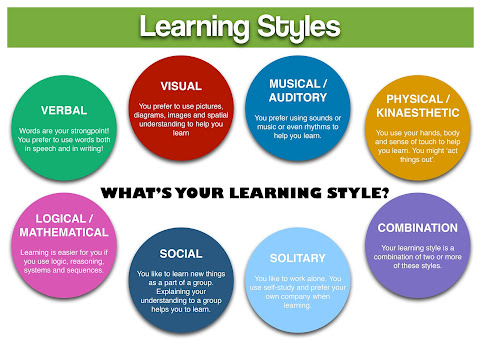GETTING READY TO LEARN (UED102- STUDY SKILLS)
GETTING READY TO LEARN BY SHAH HAIKAL (UED102-STUDY SKILLS)
The
term “learning styles” speaks to the understanding that every student learns
differently. Technically, an individual’s learning style refers to the
preferential way in which the student absorbs, processes, comprehends and
retains information. For example, when learning how to build a clock, some
students understand the process by following verbal instructions, while others
have to physically manipulate the clock themselves. This notion of
individualized learning styles has gained widespread recognition in education
theory and classroom management strategy. Individual learning styles depend on
cognitive, emotional and environmental factors, as well as one’s prior
experience. In other words: everyone’s different. It is important for educators
to understand the differences in their students’ learning styles, so that they
can implement best practice strategies into their daily activities, curriculum
and assessments.
Main "Learning Styles"
- Verbal
- Visual
- Musical/Auditory
- Physical/Kinaesthetic
- Logical/Mathematical
- Social
- Solitary
- Combination
1.
1)
Get
Organized: Making a plan
for what you're going to do and when you're going will make sure you're always
ahead of the curve - literally.
to do it
2)
Don't
multitask: Studies have
shown that multitasking is physically impossible.
3)
Divide
it up: Studying isn't
fun to begin with, and forcing yourself through a study marathon will only make
it worse. Dividing your work into manageable chunks and rewarding yourself when
you finish each chunk will make studying (more) fun.
4)
Sleep: Don't underestimate the importance of
those eight hours of zzz's every night! Getting a good night's rest will
sharpen your focus and improve your working memory.
5)
Set
a schedule: Do you work
better right after school or after you've eaten dinner? Are you more productive
in 90-minute blocks or half-hour spurts? Find a schedule that works for you,
and stick to it.
6)
Take
notes: Taking notes
will not only keep you more engaged during class, but will also help you narrow
down what you need to study when exam time rolls around. It's much easier to
reread your notes than to reread your entire textbook!
.jpg)



Comments
Post a Comment